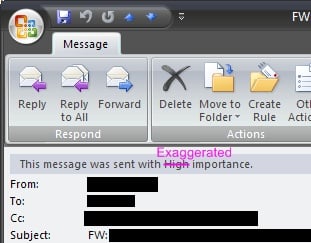You have /5 articles left.
Sign up for a free account or log in.
Natascha Chtena is a PhD student in Information Studies at the University of California, Los Angeles. You can follow her on Twitter @nataschachtena.

About once a week I will open my inbox and be greeted by an email that will leave me at a loss for words. A few nights ago, for instance, one student emailed me at 10:30PM on a Sunday requesting—“urgently”—a meeting at 7:30 the next morning. She wanted to discuss an assignment that was due the day after and couldn’t make it any other time during the day. After about 20 minutes of staring at my phone in disbelief, I decided not to respond—at least not immediately. I emailed her the next day and, referring to my email policies on the course syllabus, explained that I don’t respond to emails after 7PM, let alone on a Sunday. I offered to Skype with her later that day and the student responded by apologizing profusely.
We all get them: the emails that are too informal, absurd, or downright inappropriate. Walk into any TA office and within 15 minutes you will hear at least one person complaining about a student email. They come in all shapes and colors, of course. But whether they're just missing a greeting, are full of typos, include sexual innuendos, or are just written in a rudely demanding tone, they all clearly show that many students just don't know how to communicate properly.
So how should we address these types of communication? Below are some strategies for maintain your sanity via email:
Set the tone: I include an email policy in my syllabus and, over time, this section has grown significantly. I started by merely stating the days and times I was unavailable and how soon students should expect a response. Gradually, I started adding guidelines on how to structure emails: clear subject, greeting, no Internet slang, etc. And while I don’t include a clear statement on the type of email communication that is acceptable to me (eg “I will only respond to questions about coursework or academic requirements. I will not respond to questions of a personal nature”) for fear of coming across as aloof, I do offer some examples of emails that just aren’t cool. For instance: “Hey sorry I wasn’t in class today—bad hangover ;) Just wanted to check that I didn’t miss anything important??”
Be a mentor: I consider all my conversations with students in all media to be potential teaching moments. Students are often unaware that what they write in an email could adversely affect them. What’s more, most of them grew up in a world of instant messaging, LMFAOs, and Nyan Cats, a world that treats emails less like letters and more like texts. I thus see email as an opportunity for students to learn proper communication techniques and for me to model professional email etiquette. If you need some inspiration, the Association for Psychological Science has a great article with a series of sample responses to inappropriate student emails.
Instruct them (directly, if you have to): I don’t believe that students (by and large) mean harm when they compose those emails, but I do believe that sometimes someone needs to put their own words into perspective for them. While usually an email response is enough to shake them back to self-awareness (as with my student from the intro), there are occasions where a more drastic approach may be necessary. One quarter, for example, I was getting so many random emails for some reason that I set aside some class time to instruct my students on the characteristics of appropriate email for a course. I put together a PowerPoint outlining the guidelines I had in the syllabus and included appropriate and inappropriate examples of the same communication, using their very own “inappropriate” emails (anonymously of course). My comments were firm but humorous and at the end of the presentation most of the “culprits” were blushing, remorseful, and laughing at themselves.
Take it personally (in a good way): While I don’t advocate ignoring emails as a matter of course, I do believe that sometimes no response is the best response. I do feel free to ignore the silly or rude requests sometimes. That usually gets the writers to question what they did wrong. But often “ignoring” emails for a little while, rather than completely, can be effective as well. This is especially true with angry emails, because it gives the student time to step away or, at least, calm down. More broadly, I have found that the clearer boundaries I set, the fewer inappropriate emails I get. I have learned the hard way that being available for students is not about responding to emails 24/7.
Be prepared for the worst: Sometimes a student will go too far and it's important to set clear boundaries from the start. Don't engage in an email dialogue with the student. If a student emails you sexual innuendos or a romantic request, talk to them privately after class or hold an office meeting, ideally with a responsible third party who can speak on your behalf, in case the student attempts to damage your reputation afterwards. You might say, "I will only participate in a professional teacher-student relationship with you, and I'd like you to stop sending any emails that are personal or romantic in nature." If the emails persist, notify your supervisor or the dean of students to report the situation. The same also applies to death threats and other harassment.
How do you deal with inappropriate student emails? Share your wisdom in the comments below!
[Image by Flickr user tmbg47 and used under Creative Commons licensing]




